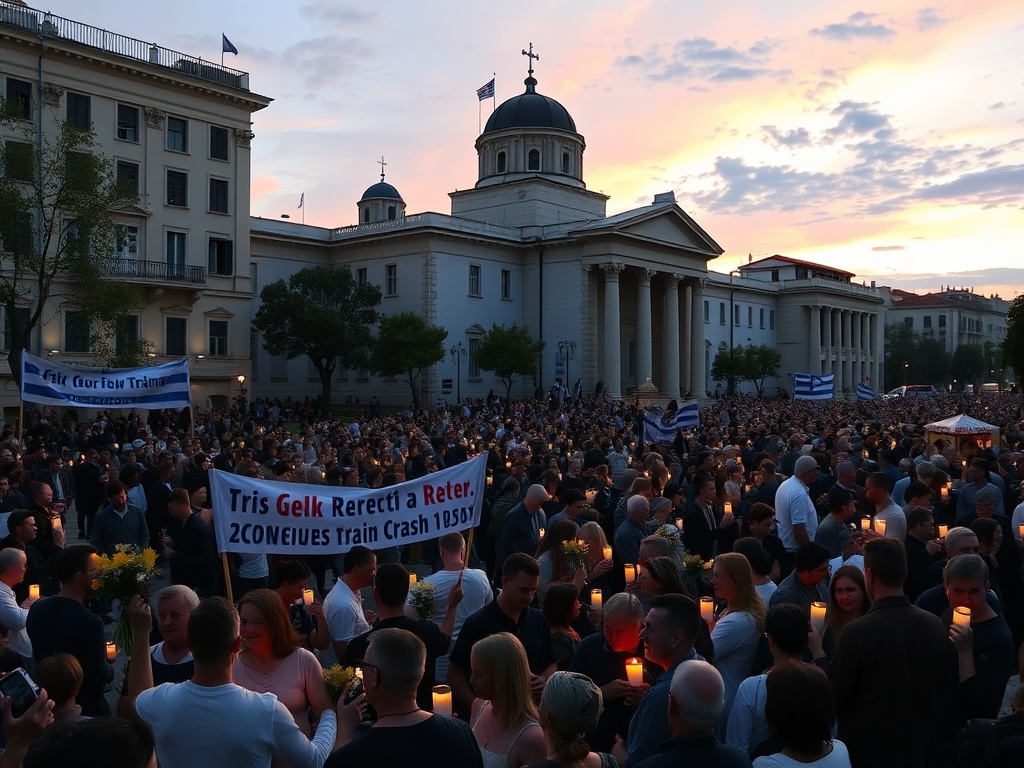Protests Erupt in Athens Marking Two Years Since Fatal Train Crash

In a dramatic display of public sentiment, tens of thousands of protesters took to the streets across Greece to commemorate the second anniversary of a tragic train collision that claimed the lives of 57 individuals. The atmosphere turned tense as demonstrators clashed with riot police in central Athens, where scenes of chaos unfolded. Protesters were seen hurling molotov cocktails and smashing paving stones, while police responded with tear gas and stun grenades near Syntagma Square, a focal point for the rally.
As tensions escalated, paramedics were observed assisting at least one protester injured amid the unrest. The protests were sparked by the devastating train crash that occurred on February 28, 2023, when a passenger train collided head-on with a freight train in the Tempe Valley, revealing significant flaws in Greece’s transportation infrastructure.
In response to the unrest, flights and rail services were canceled, ferries were halted, and public transportation across the nation experienced severe disruptions. Many businesses in Athens closed their doors, displaying messages of solidarity for the victims’ families in their windows.
To maintain order, more than 5,000 police officers were deployed throughout the capital, a move aimed at managing the crowds and preventing potential violence. Friday’s protests, among the largest since Greece’s debt crisis a decade ago, reflected widespread public discontent directed at the conservative government’s perceived inaction regarding the railway system’s safety.
Criticism of Government Accountability
Critics assert that politicians should be held accountable for the systemic failures that led to the disaster, yet so far, only railway officials have faced charges. The Tempe tragedy, recognized as Greece’s worst railway accident, has left a lasting impact, prompting calls for justice and change. Yannis Panagopoulos, president of the General Confederation of Greek Workers, the largest labor union in the country, emphasized, “The full truth must come to light, and those responsible, no matter how high their position, must be held accountable.”
In Athens, demonstrators gathered in front of Parliament, and events were planned in over 300 cities and towns, both within Greece and abroad. Protesters chanted slogans such as, “You count profits. We count lives,” while carrying black balloons and anti-government banners. Costas Reintzopoulos, a municipal worker in Athens, highlighted the ongoing demand for safer working conditions, noting that eleven of the deceased were railway employees.
“Every day, there is a demand to know the truth about what happened, and every day there is a demand for better safety measures in the workplace. That is a key reason why this remains relevant,” he stated. “We don’t want to mourn more dead people who leave for work each day, not knowing if they’ll return.”
In memory of the victims, memorial services were scheduled at Orthodox churches in Athens. Families of the victims have urged protesters to focus on remembrance rather than political agendas. “This day is one of remembrance, respect, and reflection,” an association representing the families stated. “It is dedicated to those who were unjustly lost, to the grieving families, and to the pursuit of justice that remains unresolved.”
Political Implications for the Government
The protests present a politically sensitive moment for Prime Minister Kyriakos Mitsotakis’ administration. While his party maintains a significant lead in public opinion polls, growing dissatisfaction over the Tempe disaster has led to increased support for anti-establishment parties across the political spectrum.
Opposition leaders are contemplating a censure motion as public frustration mounts. Mitsotakis has pledged to enhance rail safety, asserting, “Every Greek participates in this mourning, united under the common demand for truth.”
Greece’s mountainous terrain and reliance on road transport have made the nation’s railway system, primarily connecting Athens and Thessaloniki, a focal point of scrutiny. A recently released report on the investigation into the Tempe crash attributed the disaster to human error, outdated infrastructure, and significant systemic failures.
The aftermath of the crash was characterized by harrowing accounts from survivors, with many describing the chaos as carriages tumbled, fires erupted, and shattered windows filled with panic. The grim task of victim recovery and identification followed, as many bodies were severely burned or dismembered, with funerals held across various communities, often broadcast to a national audience.
Maria Krystianou, a pediatrician whose daughter, 21-year-old Maria-Thomai, perished in the crash, has emerged as a prominent figure advocating for accountability. In her emotional address to the crowd outside parliament, she expressed gratitude to unions and associations for their support: “For those of us who had our children and loved ones on that train, a part of us remains with them and will never return. The unrelenting pain and the unimaginable reality are with us forever.” She concluded, pointing to the protesters, “This is for you, my girl, and for those of us who never made it.”




